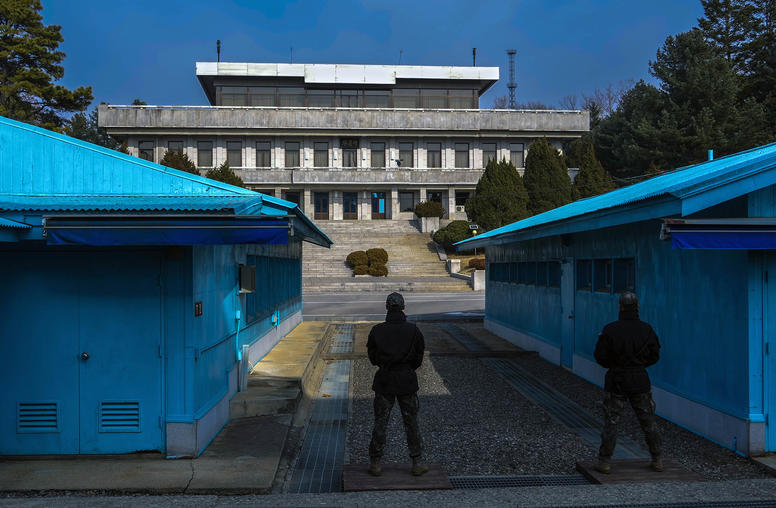Confronting the Legacy of the Past: Promoting Justice and Reconciliation in East Asia
A day-long public event
Japan’s history of colonialism and wartime aggression remains a critical issue in relations between Asian countries. Prime Minister Abe's recent statement on women coerced into servitude has drawn official protests from governments in the region and the denunciation of victims' rights groups.
On March 30th, a diverse group of Japanese, South Korean and American scholars and activists will present their views and experiences related to dealing with the past and promoting justice and accountability in Japan and reconciliation in East Asia. They will examine how and whether public education, memorialization, and legal advocacy efforts have contributed to reconciliation efforts and an understanding of the past.
Archived Audio
To listen to audio or to view video, please click on the links provided below. You also can right click on the links and choose "Save Target As" or "Download Linked File." This will save the file to your computer and then allow you to play it in your media player directly. More Audio Help.
Agenda
9:00 – 9:15 AM - Registration
9:15 – 9:30 AM - Welcoming Remarks by Richard Solomon, President, USIP
9:30 – 10:45 AM - Panel I: Reparation, Reconciliation, and History Education
- Hiroshi Oyama (Attorney and Advocate)
Oyama will discuss the role of law in reconciliation. He will also discuss achievements and challenges he has experienced in bringing compensation lawsuits.- Download Hiroshi Oyama's Remarks
PDF - 36 KB
- Download Hiroshi Oyama's Remarks
- Shin’ichi Arai (Professor Emeritus, Department of History, Suruga University; WWII Veteran)
Arai will examine how the Chinese, Japanese and South Korean governments have dealt with the legacy of Japan’s wartime atrocities since 1945. By comparing regional and historical differences, he will underscore how international and domestic political environments have influenced official debates regarding war crimes and reparations.
- Download Shin'ichi Arai's Remarks
PDF - 48 KB
- Download Shin'ichi Arai's Remarks
- Tokushi Kasahara (Professor of Chinese History, Tsuru Bunka University)
Kasahara will compare different descriptions of the Nanjing Massacre in China and Japan. He will analyze the role of nationalism in history education in both countries and its impact on the process of reconciliation.- Download Tokushi Kasahara's Remarks
PDF - 56 KB
Moderator: Jeff Helsing, Deputy Director of Education, USIP
- Download Tokushi Kasahara's Remarks
10:45 – 11:00 AM - Break
11:00 – 12:00 Noon - Discussion Session One
- Panel Discussant: Daqing Yang, Department of History, George Washington University
A question and answer session will follow.- Download Daqing Yang's Remarks
PDF - 36 KB
- Download Daqing Yang's Remarks
12:00 – 1:30 PM - Light Lunch and Address
- Rear Admiral Michael McDevitt (USN-Ret.)
Director of the Center for Strategic Studies for the CNA Corporation.
1:30 – 2:45 PM - Panel II: The Role of Museums in Education and Reconciliation
- Takashi Yoshida (Senior Fellow, USIP)
Yoshida will provide a broad historical background of postwar Japanese peace activism and museums as well as discuss the changing role of the Yasukuni Shrine's Yushukan War Musuem from the 1930s to the present.- Download Takashi Yoshida's Remarks
PDF - 48 KB
- Download Takashi Yoshida's Remarks
- Rumiko Nishino (Director, Women's Active Museum on War and Peace)
Nishino will share her experiences from opening a small private museum that highlights various forms of violence against women.- Download Rumiko Nishino's Remarks
PDF - 36 KB
- Download Rumiko Nishino's Remarks
- Yeonghwan Kim (Associate Director of Grassroots House Peace Museum)
Kim has organized week-long fieldwork programs in which college students excavate the bones of slave laborers in coal mines in Hokkaido. Hundreds of college students, mainly from Japan and South Korea, have participated in the fieldwork. Kim will speak of his experiences in order to offer clues as to possible approaches to facilitating reconciliation in East Asia.- Download Yeonghwan Kim's Remarks
PDF - 40 KB
Moderator: Judy Barsalou, Vice President, Grants and Fellows Program, USIP
- Download Yeonghwan Kim's Remarks
2:45 – 3:00 PM - Break
3:00 – 4:00 PM - Discussion Session Two
- Panel Discussant: Soon Won Park, Department of History, George Mason University
A question and answer session will follow.
4:00 – 4:30 PM - Concluding Remarks
- Mike Mochizuki, Department of Political Science, George Washington University
- Download Mike Mochizuki's Remarks
PDF - 44 KB
- Download Mike Mochizuki's Remarks
4:30 – 5:30 PM - Reception



